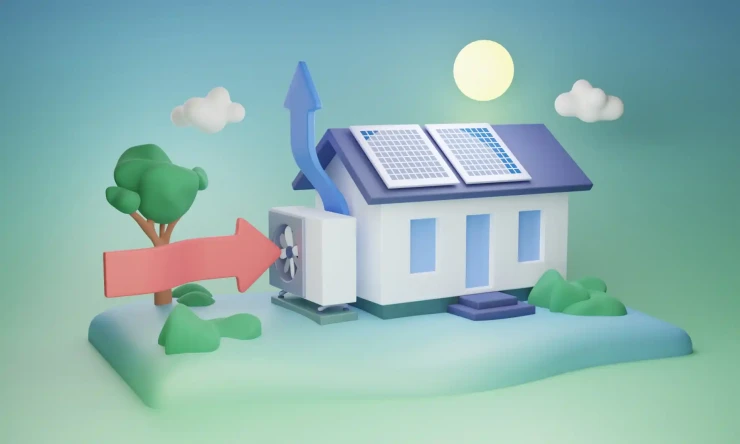
Swimming pools are a quintessential part of summertime for many of us. However, the environmental impact of these ubiquitous garden oases is starting to raise concerns. Between water consumption, energy use for heating, and chemicals needed to keep pool water clean and sanitised, pools have the potential to be quite taxing on the environment. This has led some to question – is it possible to have an eco-friendly swimming pool?
While pools have their drawbacks, the reality is that with some thoughtful adjustments, pool owners can dramatically reduce the environmental footprint of their pools. Here, we'll explore some of the main concerns around pool sustainability, as well as solutions pool owners can implement to swim a little greener this summer.
COMPARE PRICES FROM LOCAL INSTALLERS
Compare prices from local companies fast & free
Enter your postcode to compare quotes from leading professionals. We promise to keep your information Safe & Secure. Privacy Policy
Why are swimming pools believed to be harmful?
Swimming pools require a lot of water, chemicals, and energy to keep them clean and usable. This leads many to view pools as detrimental to the environment.
Pools lose thousands of litres of water each year to evaporation and backwashing filtration systems. This is water that essentially goes down the drain and is continuously refilled, wasting a precious resource. The average pool loses anywhere from 15,000 to 50,000 gallons of water annually. With countless pools across the country, this usage soon adds up.
The chlorine, algicides and other chemicals used to sanitise pool water can also contaminate groundwater if allowed to leak or spill. These chemicals are quite toxic and improper pool maintenance can lead to runoff issues. Even in low concentrations, the chemical soup found in pool water can be harmful if it makes its way into local waterways or the water table.
Heating pools requires a tremendous use of energy too, most often from gas or electricity produced from fossil fuels. This effect is amplified in cooler climates where pools need to be heated for a greater portion of the year. The electricity used to power pumps, filters, lights, and heaters makes pools energy hogs.
Tips for a sustainable pool
Keep it natural
For the ultimate in pool sustainability, some homeowners are opting to build natural swimming pools. These pools rely on plants, beneficial bacteria, and other natural systems to clean and circulate the water with minimal chemical use.
Natural pools contain zones with aquatic plants that filter out contaminants just like in a wetland ecosystem. The plants absorb nutrients in the water that would otherwise feed algae growth. Gravel beds provide surface area for helpful bacteria to grow and balance the microbial ecosystem. The plants also oxygenate the water, creating a healthy environment.
This natural biological filtration removes the need for harsh chemicals like chlorine. Any occasional sanitisation relies on non-toxic methods compatible with plants and wildlife. Natural pools use no power and need less maintenance than traditional pools, and they offer the added benefit of providing a natural habitat for local wildlife and birds.
Use saltwater chlorination
One of the best ways to reduce the environmental impact of your pool is to switch to a saltwater chlorination system for water sanitisation, rather than conventional chlorine. So how does this method work?
Saltwater systems use dissolved salt as the main agent to sanitise pool water. A device converts the salt into chlorine through an electrolytic process, eliminating the need to directly add concentrated liquid or tablet chlorine. The chlorine produced is still effective at killing bacteria and algae but gets used up quickly and doesn't build up to high levels in the water.
This approach is gentler on the environment in a few key ways. First, as we’ve discussed, it reduces chemical use and results in healthier water for you and your family. But it’s also lower maintenance because the system does much of the sanitisation for you. While saltwater systems have a higher upfront cost, they pay back over time through easier maintenance. Similarly, your conscience can rest easier knowing your pool has less impact on the local environment.
Use a pool cover
One of the simplest ways to increase the eco-friendliness of your pool is to install a pool cover. When not in use, covering the pool surface significantly reduces evaporation of water into the air. This conserves water and reduces the energy needed to continually replenish and reheat evaporated water.
Solar covers float on the surface and are made of plastic bubbles that absorb and retain heat while limiting evaporation, which also lowers heating costs. Safety covers, meanwhile, completely seal the entire pool surface and are anchored around the perimeter to prevent anything from entering the water. This provides maximum water conservation.
Make use of solar heating
Heating swimming pools accounts for a significant portion of their energy use. Traditionally, pools are heated by natural gas or electric heat pumps. For a greener alternative, solar heating is an effective way to harness renewable energy from the sun.
You can heat your pool using solar PV panels or with a solar pool heating system. Both use sunlight to create energy but in different ways. Solar panels convert sunlight into electricity that can then power a heat pump, whilst a solar water heating system uses solar collectors to absorb heat from sunlight and then heat the water.
Solar collectors are very efficient and can raise pool temps up to 10°F. They contain tubes of water or other heat-absorbing medium like silicone, and once the sun's rays contact the tubes, they warm the liquid inside. The heated liquid is then pumped through a heat exchanger to transfer thermal energy into the pool water, thereby increasing its temperature.
Design with low maintenance materials
The materials used to construct and maintain a swimming pool can also have environmental implications. Conventional pools use materials that require a lot of energy and chemicals for upkeep. Prefabricated fibreglass shell pools are an increasingly popular low maintenance option. The sturdy fibreglass construction resists cracking and deterioration better than concrete. It’s easier to clean without heavy-duty detergents and is more energy efficient, retaining heat better than other materials.
Adding a mineral sanitiser system also helps keep water crystal clear and reduces chlorine use. Minerals like silver, zinc, and copper inhibit bacteria and algae growth while being safe for swimmers and the environment. As mentioned earlier, using a saltwater chlorination system also generates chlorine from salt on-site to reduce chemical use.
Exploring energy-efficient and low-maintenance materials can make your pool construction more sustainable. The choices you make in building materials impacts how "green" your pool will be over its lifetime.
Having an eco-friendly swimming pool is indeed possible with careful planning and by implementing sustainable options. While traditional pools have raised concerns about overconsumption of water, energy, and use of harsh chemicals, today's technology provides effective solutions.
Find a local installer
Welcome to the biggest directory of UK renewable energy companies




























